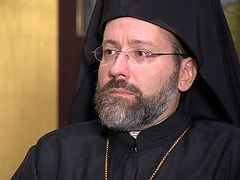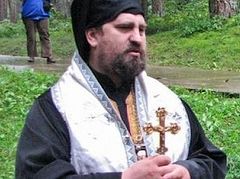Chambésy, Switzerland, November 3, 2018
Archbishop Job (Getcha), a hierarch of the Ecumenical Patriarchate, gave an interview with the BBC recently in which he spoke about the crisis in Ukraine and the prerogatives of the Ecumenical Patriarchate.
In particular, he made the provocative claim that all bishops in Ukraine are now hierarchs of the Ecumenical Patriarchate, whether they knew it or not.
Job: It is also very important that by the Synod’s decision of October 11, the act of 1686 was abolished. From a canonical point of view, that means that the Moscow Patriarchate no longer exists in Ukraine today. All hierarchs are de facto hierarchs of the Ecumenical throne according to this decision of this synod, and now they have to wait for the directives of the Ecumenical Patriarchate regarding their further functioning and existence in the prospect of granting autocephaly to the Orthodox Church in Ukraine.
<…>
BBC: So, at some point Metropolitan Onuphry will receive a letter from Patriarch Bartholomew giving him some directives?
Job: I can’t tell you what will happen, but it is necessary to understand that the repeal of the act of 1686 abolished the administration of the Moscow Church of the Kiev Metropolia and all dioceses in Ukraine.
However, the entire episcopate of the Ukrainian Orthodox Church, and a growing number of dioceses have proclaimed precisely that their canonical status as a self-governing body of the Russian Church is sufficient for their evangelical calling in Ukraine.
BBC: So you mean that those Ukrainian hierarchs who do not go to the unification council will find themselves outside the law, outside the canons on the territory of Ukraine?
Job: According to the canons of the Church, there cannot be two parallel Churches on one territory. If it would be as some say—that whoever doesn’t want Ukrainian autocephaly can remain as a Russian exarchate or whatever else—it’s simply anti-canonical. According to the canons of the Church, there should be only one Orthodox Church on the territory of one state, and this autocephalous Orthodox Church should unite everyone.
BBC: And Estonia?
Job: In Estonia, first, it’s not autocephalous. It’s an autonomous Church—there’s a difference. And second, the Estonian option was a compromise, found temporarily.
BBC: That is, it will not be Estonia in Ukraine?
Job: If we want to follow the canons of the Church, there cannot be a repetition of Estonia in Ukraine.
Interestingly, here Abp. Job essentially admits that the Ecumenical Patriarchate’s 1996 creation of a competing Church in Estonia was against the canons, creating a lamentable situation that persists until today.
The Phanar hierarch also made an interesting remark that touched upon the history of the Kievan Church, saying, “If the Ecumenical Patriarchate wanted to acquire something, it could say: ‘We have the right to restore our Metropolia that existed [in Kiev] until the end of the 17th century.’ But Constantinople does not want that.” Abp. Job thereby acknowledges the veracity of the Russian Church’s claim that the Kiev Metropolia came under its jurisdiction in 1686.
In the same interview, Abp. Job also declared that Constantinople can both give and revoke autocephaly at will, subtly threatening the Russian Church in this way.
Follow us on Facebook!




